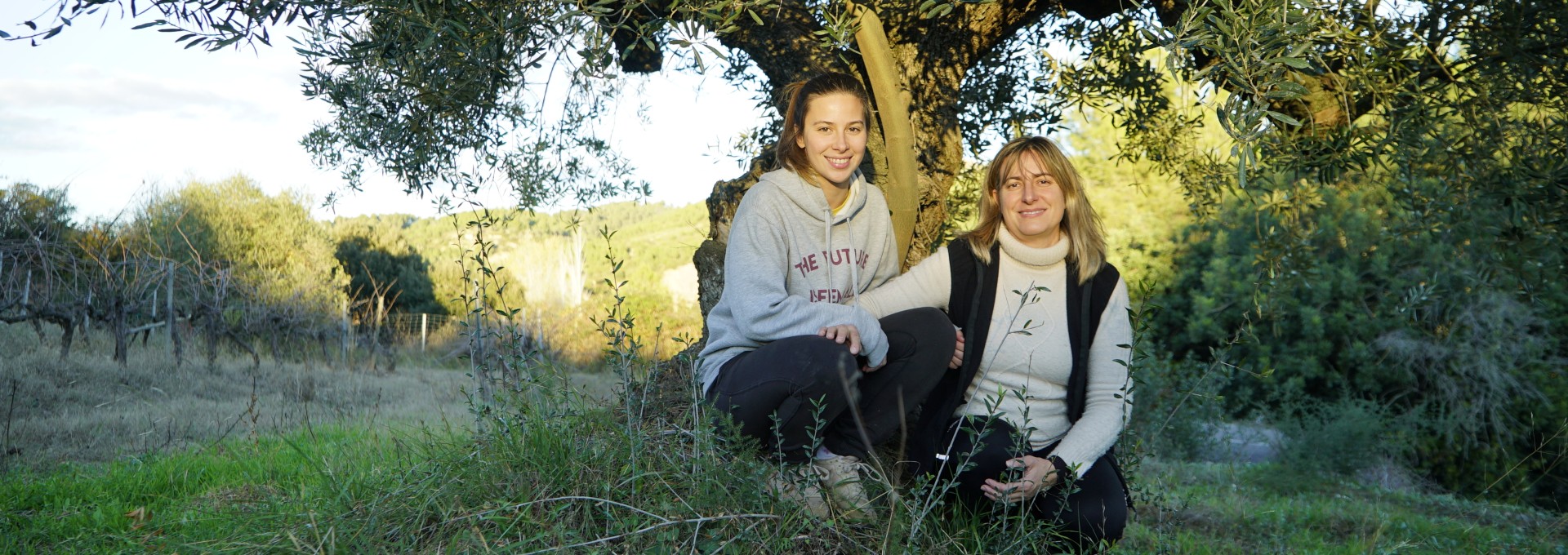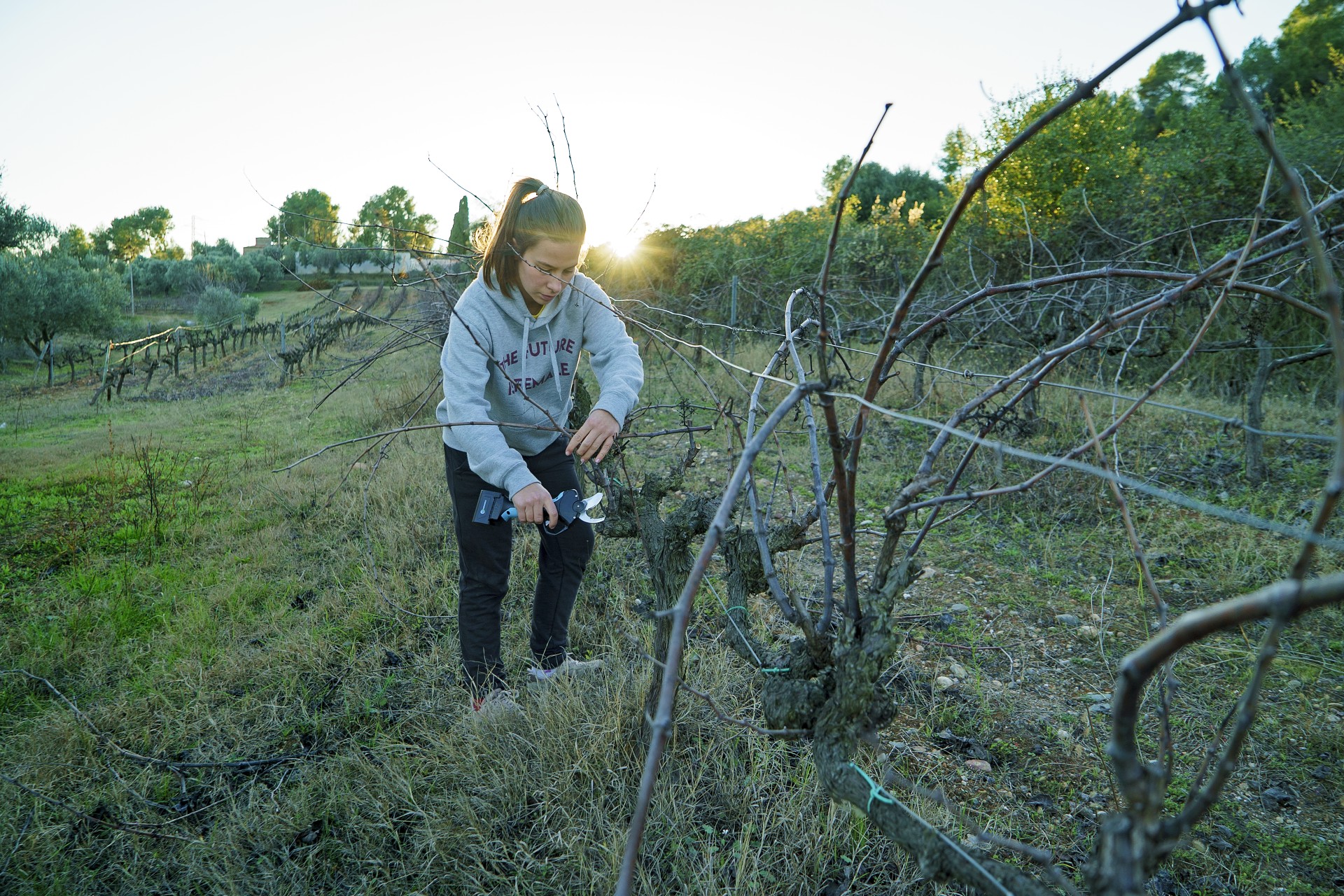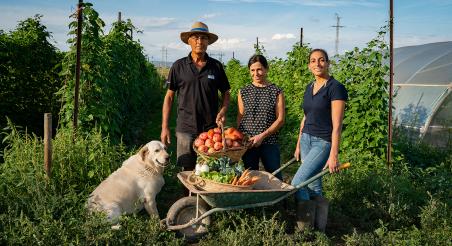At the Can Morral del Molí winery, Maria Font (Ullastrell, 1973), her husband Xavier and their daughter Mariona share the habit of waking up early, crossing the road on foot and setting to work on their grapevines. They go about their tasks in an enthusiastic, carefree manner, approaching farming as an artistic, creative endeavour that enables them to follow the rhythm of nature and protect the landscape. They form a tight-knit team on their farm which, like those of yesteryear, has a bit of everything. Set between Abrera and Ullastrell, it covers 54 hectares of land, ten of which are occupied by grapevines certified by the Catalan Council for Organic Agricultural Production (CCPAE). Fruit trees, olive trees, a market garden and livestock complete a picture that’s created in practice through regenerative and biodynamic farming techniques. The family decided to open a winery 15 years ago with the goal of producing wine using age-old methods. In addition to wine tastings in a dedicated area set up in the farmhouse, they offer regular guided tours, along with other wine tourism activities.
Anyone who meets this family can be in no doubt that they love their work and farmhouse. Can Morral del Molí was inherited by Xavier Morral, who was born here in 1953. He’s always had a close relationship with the land and continues to apply the knowledge he gained growing up in a farming family. His wife, Maria Font, had studied something else but embraced her new life with optimism and pragmatism. Meanwhile, the household’s youngest member, their daughter Mariona Morral Font (Terrassa, 1998), studied oenology and is keen to take the company forward.
Surrounded by woodland, the vineyards of Can Morral del Molí produce several varieties: tempranillo, Chardonnay, grenache noir, muscat, xarello, sumoll and maccabeo. The vine stocks, which are between 60 and 80 years old, coexist with the century-old becaruda olive trees, native to the area, which stand at the edges of the vineyards. The oil produced from the becarut olive variety is highly prized for its intense flavour.
A farm with plenty of history
Xavier explains that the farmhouse owes its name to the Count of Morrallo, who hundreds of years ago bought a large plot of land from the Marquis of Voltrera paying him in silver sous (first coined by Peter III of Aragon in 1285). Ever since, the farm has been in the hands of the Morral family, which, generation after generation, has been devoted to the cultivation of vines and olive trees. As the trees have grown over the centuries, so has the family’s feeling of belonging and love for this corner of the world.
Inheriting the family estate brought with it several obligations and responsibilities for Xavier, such as maintaining the house and land (without segregating them) and looking after his parents. In fact, his mum, who’s 102 years old, still lives in the farmhouse, which is often filled with his siblings and other members of the family at weekends.
Family also plays a huge part in the life of Maria, whose father tragically died in a tractor accident when she was very little. The void created by this early loss was amply filled by her mother and grandparents, who treated her “like a princess”. She grew up as an only child who was waited on hand and foot. When it came to choosing a university degree, she opted for business studies, which at the time felt like a significant departure from farming. Nevertheless, home for her was Ullastrell and she was perfectly familiar with the causes for which her grandad fought. He was a trade unionist who did a great deal for farmers. Among other things, he helped many farmers’ wives to obtain legal employment status: although they carried out farming tasks every day, they were not legally registered as workers and would not have been entitled to a pension had it not been for the efforts of Maria’s grandad.
Then, one fine day, the princess met the heir of Can Morral del Molí, a widower with two children, and in 1997 the couple got married. After shuttling for a while between Ullastrell and Can Morral del Molí, they eventually decided to settle in the farmhouse inherited by Xavier. “I went from being a princess to becoming a farmer, and in doing so I realised that being a princess is really boring,” says Maria, laughing.
Life has been non-stop for her as a farmer. She’s still learning new skills, but one of the very first was the art of cooking. “Growing up, my mum was the cook, I couldn’t even fry an egg. But now I’ll have a go at anything: pig’s trotter stew and whatever’s required!” Another valuable lesson she’s learned is that farmers aren’t masters of their own time but rather they’re governed by the demands of nature: “It’s no good saying ‘Now’s not a good time’, you just have to get on with it. There are other more flexible tasks that you can organise as best suits you, but when it comes to crops, they guide you and tell you exactly when to perform a certain task.”
Continuous learning
Maria’s daughter Mariona agrees: “It may sound rather poetic, but nature’s in charge and you have to fall in line.” To illustrate her point, she describes a couple of typical farming experiences. It might be that she wants to start picking grapes on a particular Wednesday but then there’s some terrible hailstorm or thunderstorm and the job inevitably has to be postponed to a later, more suitable date. Or she might be away somewhere on holiday in July when a sudden heatwave makes the grapes ripen sooner, bringing forward the harvest and forcing her to rush back to meet the sudden demand for personnel in the vineyard.
Taking farming problems in one’s stride is just as important as realising that the farming life requires real dedication. “There’s no point getting frustrated with things that don’t just depend on you. The same applies to our personal lives,” she reflects. At 24 years old, Mariona is well aware that being a farmer means embracing a particular lifestyle. She’s always on the go. After completing her studies at the Rovira i Virgili University in Tarragona and working at other local wineries, she spent some time in Uruguay, where she worked on the grape harvest.
Creativity applied to farming
Obeying nature is not at odds with being creative. Mariona feels that the secret is to strike a balance between nature’s needs and her preferences. For example, when it comes to pruning a fruit tree, she observes the direction in which the tree has grown. Although she does the necessary pruning work to ensure it bears fruit, she doesn’t interfere with the direction of its growth but rather she allows it to develop naturally. “It’s amazing when you develop this kind of bond with nature,” she adds.
Mariona is good at transmitting what her work involves and is quick to offer another real example of creativity applied to farming. She says that when she stands before a vine stock, she’s already beginning to plan the type of wine she wants to make, and this exercise of the imagination sets in train the creative process. Such a close, inventive relationship with nature is what makes farming life priceless for her. “It amazes me how farming creates life. Farming is an art,” she proclaims. In fact, whenever someone tells her that only architects or artists produce art, she always gives the same reply: “I make art too. Farmers also create art!”
«It amazes me how farming creates life. Farming is an art» Mariona Morral
From grapes to wine, the creation of the winery
Mariona’s optimism and determination reflect her mum’s energy. Xavier and Maria had been married for a few years when they began to farm their vineyards organically and created the winery. Apart from their desire to try something new, a practical reason lay behind their decision: their grapes were fetching such low prices that they opted to make the switch to winegrowing. “It’s always been a contentious issue: farmers are not being paid fairly for their grapes,” Maria points out. They now make natural wines with minimal intervention: unfiltered, unclarified, fermented in their own naturally occurring yeasts, and with no added sulphites. They also make sparkling wines that hold the Penedès Denomination of Origin seal. What’s more, in order to set themselves apart from conventional cava, they’ve joined the Clàssic Penedès DO. "We want to lend more prestige to our product, which is why we insist on using organic grapes and ageing our wines for at least 18 months,” she explains.
Becoming a winery brought with it a bigger workload. Prior to making the switch, once they’d harvested and sold their grapes, their work in the vineyard was done until the pruning season came around. Winemaking, on the other hand, involves all sorts of additional tasks: bottling, labelling, disgorging, etc. In fact, a visit to the winery not only delights our senses but also triggers thoughts: the typical tasks of an ancient profession instantly come to mind. When they set up the winery, they realised they wanted a closer relationship with the end customer, which is why they started offering guided tours and tastings. Wine tourism is their main business strategy going forward: on the one hand, it enables them to sell their products direct to the customer, removing the need for intermediaries; on the other hand, they appreciate visitors’ recognition of their work. Nothing beats having people taste and praise their wines, or feeling people’s appreciation for their care of the local environment. “We’re delighted for people to come and find out how we work and what goes into the products we make,” explains Maria.
Mariona also enthuses about the wine tourism activities they organise on the estate, since they contribute to raising awareness about farming work, which always goes under the radar. “Without farming, there’d be no food for anyone, but it’s an invisible profession,” she complains. When a friend tells her she lives in the middle of nowhere, she replies: “Keep on making your jokes, but if it wasn’t for the work we do, you wouldn’t be able to live!”
«Without farming, there’d be no food for anyone, but it’s an invisible profession» Mariona Morral
The importance of seasonal food is one of the many lessons that Mariona has learned growing up in the rural environment of the Can Moral del Molí winery. “You don’t make a tomato salad in winter in Catalonia. There aren’t any!” she exclaims. As she sees it, it makes no sense to bring in cherries on ships and planes so that people can eat them out of season. She’s convinced that a significant amount of awareness-raising activity is required to address the disconnect with nature that many consumers feel. In the past, the lives of everyone on the planet revolved around agricultural and livestock farming. People knew what food the earth provided in each season. “Whereas now there’s more confusion, some people don’t know that peas are a spring crop or that broccoli and cabbage are winter crops,” she muses.
Generational renewal in farming
When asked about generational renewal, they’re fairly sure that Mariona is the only one of Xavier’s four children who wants to take the farming project forward, although the whole family helps out in the fields and winery whenever necessary.
Maria is extremely supportive of Mariona having a career in farming, if that’s what she wants. And it would appear that she loves it! Listening to the two of them in conversation, one gets a clear sense of ideas they’ve cultivated together over the years. Maria also sees farming as an artistic profession. “What better office could you ask for than a garden or a vineyard? You can’t beat being outdoors and getting your hands dirty,” she argues. Although harvest time can be stressful due to the tight schedule or unforeseen problems created by weather events, the overall balance is extremely positive. They may have a bit of a moan back at home, of course, but generally they’re happy people doing what they love.
«What better office could you ask for than a garden or a vineyard? You can’t beat being outdoors and getting your hands dirty » Maria Font
Although they’re not losing any sleep over generational renewal at Can Morral del Molí, they’re well aware that the issue is a stumbling block for many other estates in the area. They’re pleased about the existence of initiatives such as the Land Bank of Montserrat Rural Park, aimed at facilitating the incorporation of new farmers in the area.
Looking after ecosystems
They’ve never had to overcome the hurdle of finding land, since they inherited their farm, but they have sometimes come up with ideas to make better use of their land. At one point they considered renting out plots of land, but ended up deciding against. However, they’ve reached an agreement with a shepherd, allowing his flock of sheep to graze on their land, thus helping to regenerate it. Everyone wins: the sheep enjoy high-quality nutrition while enriching the soil of vine stocks, olive groves, orchards and vegetable gardens with their manure.
They’ve begun to implement regenerative agriculture practices to mitigate the impact of climate change. However, in addition to fertilising the land with manure, they want to protect ecosystems, which is why they don’t use herbicides or insecticides. Mariona is adamant on this point: “If you use a fungicide, not only do you kill a particular fungus but also all the other fungi that may be beneficial to you and to many other animals that inhabit this ecosystem.” She doesn’t deny that farming has been altering this natural, symbiotic balance ever since the invention of farming, but precisely for this reason she advocates intervening as little as possible. Her face clouds over when she thinks about intensive and ultra-mechanised farming systems. “I won’t go down that road,” she vows.
Before we leave, we admire the determination of a family that strives to maintain the ways of traditional farming, while at the same time transforming the aspects that don’t work. The path they’ve chosen, to live and work at the Can Morral del Molí winery, fills them with joy. Despite all the paperwork and stress involved, it pays off. Theirs is a sound path that we hope will last for centuries to come.
— BCN Smart Rural Editorial —




